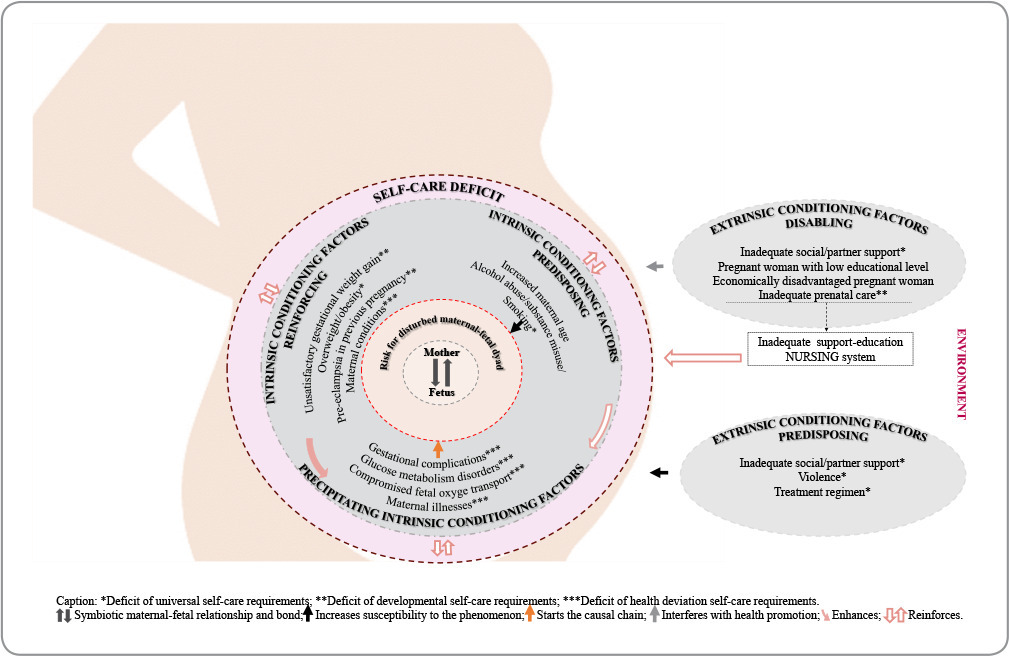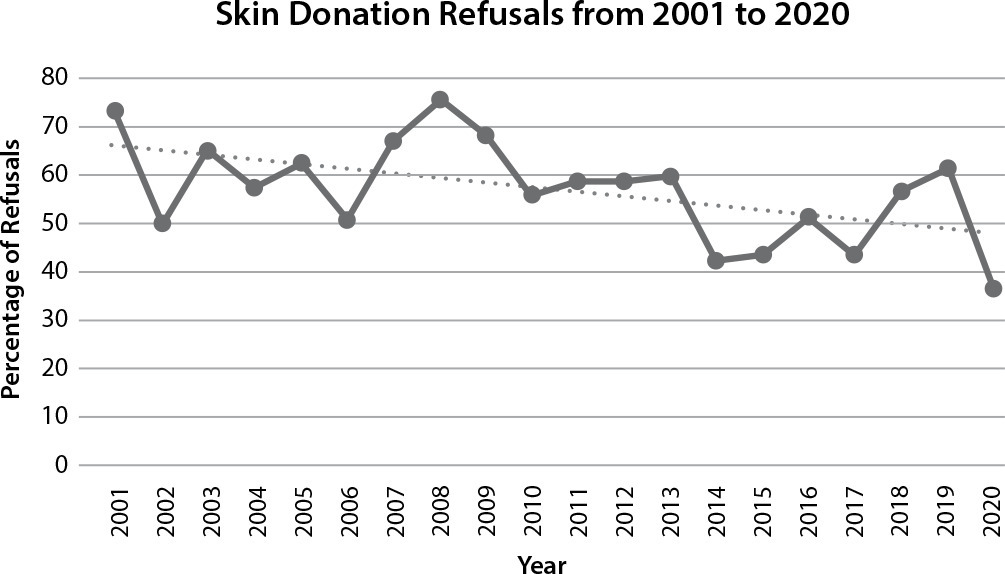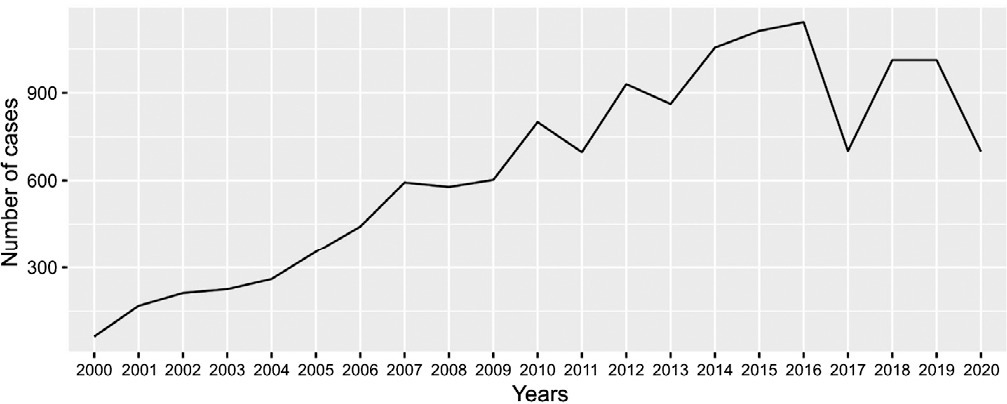-
ORIGINAL ARTICLE07-29-2024
Contribution of informal caregivers to self-care in individuals with heart failure
Revista Brasileira de Enfermagem. 2024;77(3):e20230492
Abstract
ORIGINAL ARTICLEContribution of informal caregivers to self-care in individuals with heart failure
Revista Brasileira de Enfermagem. 2024;77(3):e20230492
DOI 10.1590/0034-7167-2023-0492
Views0See moreABSTRACT
Objectives:
to evaluate the contribution of informal caregivers to the self-care of individuals with heart failure.
Methods:
a cross-sectional study was conducted with 87 caregivers from March to October 2022 in the city of João Pessoa/PB. The caregivers’ contribution was assessed using the Caregiver Contribution to Self-Care of Heart Failure Index instrument. Scores ≥ 70 points indicate adequate contribution. Data were analyzed using descriptive statistics and Spearman’s correlation.
Results:
the sample consisted of 81.6% female caregivers. Median scores obtained for the self-care contribution scales were: 63.3 for maintenance; 55.5 for management; and 66.6 for confidence. Caregivers never or rarely recommended monitoring body weight, regular physical exercise, extra use of diuretics, and fluid restriction.
Conclusions:
informal caregivers showed inadequate contribution in the areas of maintenance, management, and confidence in self-care of individuals with heart failure.
-
ORIGINAL ARTICLE07-29-2024
Mental health of parents of children and adolescents who require special health care
Revista Brasileira de Enfermagem. 2024;77(3):e20230457
Abstract
ORIGINAL ARTICLEMental health of parents of children and adolescents who require special health care
Revista Brasileira de Enfermagem. 2024;77(3):e20230457
DOI 10.1590/0034-7167-2023-0457
Views0See moreABSTRACT
Objective:
To identify the manifestations presented by parents of children and adolescents who require special health attention that can impact their mental health.
Methods:
exploratory, qualitative research, based on the concept of vulnerability, with data collection carried out through interviews with 18 parents of children and adolescents with special health care needs, hospitalized in the pediatric ward of a hospital in Paraná, between May/2017 and May/ 2018. Data analyzed by inductive thematic analysis.
Results:
parents experienced situations of vulnerability when providing care at home, with repercussions on their mental health, expressed by manifestations of lack of protection, anxiety and depression.
Final considerations:
It is important that health professionals seek to expand actions to promote care and reduce situations that generate threats, insecurities, concerns and damage to the health of parents, which can impact and further weaken care for children and adolescents who need attention especially health.
-
07-29-2024
Reflections on theoretical framework use in nursing research
Revista Brasileira de Enfermagem. 2024;77(3):e20230486
Abstract
Reflections on theoretical framework use in nursing research
Revista Brasileira de Enfermagem. 2024;77(3):e20230486
DOI 10.1590/0034-7167-2024-0486
Views0See moreABSTRACT
Objectives:
to reflect on theoretical framework use in nursing research.
Methods:
a theoretical-reflexive study, based on concepts and constructs pertinent to using nursing theories and other sciences, considering issues of epistemology or philosophy of science.
Results:
we presented what it is and why to do nursing research and what a theoretical framework is and why to use it, in addition to some considerations regarding theoretical framework use in nursing research, essential for constructing disciplinary knowledge, which enables the materialization of researchers’ work and the presentation of propositions resulting from investigations in and for nursing as a discipline and science.
Final Considerations:
based on a reflection based on epistemological conceptions, it is possible to affirm that a theoretical framework is the core of researchers’ thinking, delimiting a problem to be investigated and, based on it, outlining methodological strategies to be followed, supporting nursing action and thinking as discipline and science.

-
REVIEW07-29-2024
Nursing diagnoses for people hospitalized with heart failure: an integrative review
Revista Brasileira de Enfermagem. 2024;77(3):e20230471
Abstract
REVIEWNursing diagnoses for people hospitalized with heart failure: an integrative review
Revista Brasileira de Enfermagem. 2024;77(3):e20230471
DOI 10.1590/0034-7167-2023-0471
Views0See moreABSTRACT
Objectives:
to identify in the literature the main nursing diagnoses according to the NANDA-I diagnostic classification for people hospitalized with heart failure.
Methods:
an integrative literature review, carried out in February 2019 and updated in July 2023, in the MEDLINE via PubMed, LILACS, SciELO and CINAHL databases. Given the use of acronym PEO, studies without a time cut in Portuguese, English and Spanish were included. Descriptive analysis was carried out to present the identified information.
Results:
analysis of 27 articles identified 24 nursing diagnoses, with emphasis on Decreased Cardiac Output, Excessive Fluid Volume, Decreased Activity Tolerance and Fatigue.
Final Considerations:
evidence can contribute to better diagnostic decisions centered on people with heart failure in search of more assertive health results and have the potential to support future studies on a possible syndromic pattern in this population.

-
ORIGINAL ARTICLE07-29-2024
Disrupted mother-fetus dyad risk in high-risk pregnancies: a Middle-Range Theory
Revista Brasileira de Enfermagem. 2024;77(3):e20230464
Abstract
ORIGINAL ARTICLEDisrupted mother-fetus dyad risk in high-risk pregnancies: a Middle-Range Theory
Revista Brasileira de Enfermagem. 2024;77(3):e20230464
DOI 10.1590/0034-7167-2023-0464
Views0See moreABSTRACT
Objectives:
to develop and evaluate a Middle-Range Theory for the nursing diagnosis “Disrupted Mother-Fetus Dyad Risk” in high-risk pregnancies.
Methods:
this methodological study was conducted in two stages: theory development and evaluation. Dorothea Orem’s General Nursing Model was used as the theoretical-conceptual foundation. Evaluation was conducted using the Delphi method with seven judges, and consensus was achieved when the Content Validity Index of the evaluated items was ≥ 0.80.
Results:
the theory identified 20 elements of the nursing diagnosis “Disrupted Mother-Fetus Dyad Risk” (10 risk factors, 4 at-risk populations, and 6 associated conditions), 14 propositions, and 1 pictogram. After two rounds of evaluation, the theory was considered consistent, with consensus reached for all items, each achieving a Content Validity Index ≥ 0.80.
Conclusions:
the Middle-Range Theory included biopsychosocial factors explaining the nursing phenomenon “Disrupted Mother-Fetus Dyad Risk,” which aids in nurses’ diagnostic reasoning.

-
ORIGINAL ARTICLE07-29-2024
Family refusal of skin donation for transplantation: trends and associated factors
Revista Brasileira de Enfermagem. 2024;77(3):e20230209
Abstract
ORIGINAL ARTICLEFamily refusal of skin donation for transplantation: trends and associated factors
Revista Brasileira de Enfermagem. 2024;77(3):e20230209
DOI 10.1590/0034-7167-2023-0209
Views0See moreABSTRACT
Objectives:
to analyze the trends and factors associated with family refusal of skin donation for transplantation.
Methods:
this cross-sectional study was conducted in the State of São Paulo, with family authorization terms collected from 2001 to 2020. The variables analyzed included year, age, gender, cause of death, and type of institution. Data were analyzed using linear and multiple logistic regression, with the Odds Ratio estimated at p<0.05 for statistical significance.
Results:
1,355 individuals refused skin donation. The trend of refusals decreased between 2001 and 2009 in the age groups of 0-11 years and 12-19 years, but increased in the group aged ≥60 years. This trend continued to decrease in the 0-11 years group from 2010 to 2020, and increased in the 20-40 years group. Males and the age groups of 20-40 years, 41-59 years, and ≥60 years exhibited 27%, 34%, 47%, and 53% lower chances of refusal, respectively.
Conclusions:
there is an urgent need for measures to mitigate the high number of refusals associated with skin donation.

-
ORIGINAL ARTICLE07-29-2024
Primary Health Care in transitional care of people with stroke
Revista Brasileira de Enfermagem. 2024;77(3):e20230468
Abstract
ORIGINAL ARTICLEPrimary Health Care in transitional care of people with stroke
Revista Brasileira de Enfermagem. 2024;77(3):e20230468
DOI 10.1590/0034-7167-2024-0468
Views0See moreABSTRACT
Objectives:
to understand the role of Primary Health Care teams in caring for people with stroke after hospital discharge.
Methods:
single case study, with integrated units of analysis, with a qualitative approach. Data triangulation occurred through interviews with professionals and family caregivers involved in transition of care, in addition to direct observations in rounds and document analysis. For the analyses, the analytical strategies of theoretical propositions and construction of explanations were used, with the help of ATLAS.ti®.
Results:
the importance of counter-referral, the role of community health workers and the multidisciplinary team, health promotion, secondary prevention, home visits as a visceral attribute and nurses as care managers are evident.
Final Considerations:
the high demand on teams and the Social Determinants of Health interfere with adequate continuity of care. Transitional care programs that enable continuity of care are recommended.
-
ORIGINAL ARTICLE07-29-2024
Completeness of variables in Hospital-Based Cancer Registries for prostatic malignant neoplasm
Revista Brasileira de Enfermagem. 2024;77(3):e20230467
Abstract
ORIGINAL ARTICLECompleteness of variables in Hospital-Based Cancer Registries for prostatic malignant neoplasm
Revista Brasileira de Enfermagem. 2024;77(3):e20230467
DOI 10.1590/0034-7167-2023-0467
Views0See moreABSTRACT
Objectives:
to analyze the completeness of variables from Hospital-Based Cancer Registries of cases of prostate neoplasm in the Oncology Care Network of a Brazilian state between 2000 and 2020.
Methods:
an ecological time series study, based on secondary data on prostate cancer Hospital-Based Cancer Registries prostate. Data incompleteness was classified as excellent (<5%), good (between 5%-10%), fair (10%-20%), poor (20%-50%) and very poor (>50%), according to the percentage of lack of information.
Results:
there were 13,519 cases of prostate cancer in the Hospital-Based Cancer Registries analyzed. The variables “family history of cancer” (p<0.001), “alcoholism” (p<0.001), “smoking” (p<0.001), “TNM staging” (p<0.001) had a decreasing trend, while “clinical start of treatment” (p<0.001), “origin” (p=0.008) and “occupation” (p<0.001) indicated an increasing trend.
Conclusions:
most Hospital-Based Cancer Registries variables showed excellent completeness, but important variables had high percentages of incompleteness, such as TNM and clinical staging, in addition to alcoholism and smoking.

-
EXPERIENCE REPORT07-31-2020
(In)visibility of children with special health needs and their families in primary care
Revista Brasileira de Enfermagem. 2020;73:e20190071
Abstract
EXPERIENCE REPORT(In)visibility of children with special health needs and their families in primary care
Revista Brasileira de Enfermagem. 2020;73:e20190071
DOI 10.1590/0034-7167-2019-0071
Views0See moreABSTRACT
Objectives:
to discuss the (in)visibility of children with special healthcare needs and their families in the Primary Health Care scenario.
Methods:
experience report about the difficulties faced by researchers from different regions of Brazil to locate children with special healthcare needs in the scope of primary care.
Results:
the main reason for these children and their families to be “unknown” and, therefore, not assisted in PHC, is the fact that they are followed-up by institutions/outpatient clinics and specialized and/or public rehabilitation clinics, or even because they have private health insurance.
Final Considerations:
transferring care responsibility to the Primary Health Care teams to specialized and rehabilitation institutions may be related to the lack of knowledge of the care demands of this group, as well as to the relevance of care centered on rehabilitation and the specialty instead of the long-term care, one of the features of primary health care.
-
ORIGINAL ARTICLE03-30-2020
Professional skills for health promotion in caring for tuberculosis patients
Revista Brasileira de Enfermagem. 2020;73(2):e20180943
Abstract
ORIGINAL ARTICLEProfessional skills for health promotion in caring for tuberculosis patients
Revista Brasileira de Enfermagem. 2020;73(2):e20180943
DOI 10.1590/0034-7167-2018-0943
Views0See moreABSTRACT
Objectives:
to understand the health promotion skills found in the speeches of health practitioners in care for TB patients.
Methods:
qualitative study, developed with seven practitioners involved in care for TB patients, identified from a sociocentric approach, whose speeches were submitted to analysis based on the health promotion skills model in the Galway Consensus.
Results:
there were four domains: Catalyzing change; Leadership; Planning; and Partnerships. These domains resulted from health education actions, contribution of management nursing practitioners, seeking to meet patients’ needs and articulation of professional sectors.
Final considerations:
there were some skill domains in the speeches of health practitioners, with the nurse being quoted in the development of essential skills for health promotion activities, such as catalyzing change and leading care for TB patients.
-
REVIEW09-19-2022
Authentic leadership in the educational system and in nursing education: an integrative review
Revista Brasileira de Enfermagem. 2022;75(1):e20220122
Abstract
REVIEWAuthentic leadership in the educational system and in nursing education: an integrative review
Revista Brasileira de Enfermagem. 2022;75(1):e20220122
DOI 10.1590/0034-7167-2022-0122
Views0See moreABSTRACT
Objectives:
to identify and analyze the knowledge produced in literature about authentic leadership in the educational system, as well as in nursing education.
Methods:
an integrative review, carried out in the Scopus, Web of Science, CINAHL, MEDLINE/PubMed, ERIC, LILACS databases. Articles that addressed authentic leadership in the educational system from a general perspective and within the nursing scope, as well as teaching practices of this leadership model, were eligible.
Results:
twenty-three articles met the inclusion criteria, most published in 2019, highlighting studies in the context of teaching, with a predominance in the nursing course and which were synthesized into three thematic categories.
Final Considerations:
it was found that the higher the levels of authentic leadership in the educational system, the higher the rates of other positive factors related to it, such as trust, involvement, academic optimism, responsibility, creativity, among others.

-
ORIGINAL ARTICLE12-07-2020
Construction and validation of an educational gerontotechnology on frailty in elderly people
Revista Brasileira de Enfermagem. 2020;73:e20200800
Abstract
ORIGINAL ARTICLEConstruction and validation of an educational gerontotechnology on frailty in elderly people
Revista Brasileira de Enfermagem. 2020;73:e20200800
DOI 10.1590/0034-7167-2020-0800
Views0See moreABSTRACT
Objective:
to construct and validate an educational gerontechnology on frailty in elderly people.
Method:
a methodological study developed in three stages: educational video construction, validation by expert judges and elderly people. Validation was carried out by 22 judges and 22 elderly people. Educational Content Validation Instrument was used for judges and questions adapted from the Suitability Assessment of Materials questionnaire for elderly people. For validation, agreement criterion greater than 80% was considered, verified using Content Validation Index and binomial test.
Results:
the video addresses recommendations for elderly people at risk of frailty and health-promoting habits, using cordel literature. An agreement greater than 80% was verified in all items assessed by judges and the target audience.
Conclusion:
the video proved to be valid in terms of content and appearance by judges and elderly people, with the potential to mediate health-promoting educational practices in healthy aging.

-
ORIGINAL ARTICLE10-01-2022
Self-care of elderly people with diabetes mellitus and the nurse-patient interpersonal relationship
Revista Brasileira de Enfermagem. 2022;75(1):e20201257
Abstract
ORIGINAL ARTICLESelf-care of elderly people with diabetes mellitus and the nurse-patient interpersonal relationship
Revista Brasileira de Enfermagem. 2022;75(1):e20201257
DOI 10.1590/0034-7167-2020-1257
Views1INTRODUCTIONChronic non-communicable diseases are the main causes of death and health problems in the world, causing about 41 million deaths each year, which corresponds to approximately 71% of all deaths. Among these diseases, diabetes mellitus has stood out due to the increase in its incidence and prevalence().Estimates indicate that 463 million people live with diabetes […]See more -
01-27-2020
Comparison of Interpretive Description and Qualitative Description in the Nursing Scope
Revista Brasileira de Enfermagem. 2020;73(1):e20190339
Abstract
Comparison of Interpretive Description and Qualitative Description in the Nursing Scope
Revista Brasileira de Enfermagem. 2020;73(1):e20190339
DOI 10.1590/0034-7167-2019-0339
Views0Interpretive Description BasisID is a small scale qualitative research about a phenomenon regarded in the field that aims to extract themes and patterns. This approach begins with the critical analysis of clinical and theoretical knowledge in the field. It develops the initial conceptual framework, however it does not enter procedures details. Instead, this approach explains […]See more -
REVIEW07-09-2021
Nursing care for patients in post-transplantation of hematopoietic stem cells: an integrative review
Revista Brasileira de Enfermagem. 2021;74(3):e20200097
Abstract
REVIEWNursing care for patients in post-transplantation of hematopoietic stem cells: an integrative review
Revista Brasileira de Enfermagem. 2021;74(3):e20200097
DOI 10.1590/0034-7167-2020-0097
Views0See moreABSTRACT
Objectives:
to analyze the available evidence on the nursing care provided to patients after hematopoietic stem cell transplantation.
Methods:
integrative review with the search for primary studies in four databases and a virtual health library. A broad search strategy was used, including research published in English, Brazilian Portuguese, or Spanish, between 2008 and 2018, totaling a sample of 42 studies.
Results:
the studies were grouped into three categories: multiple nursing care (n=19), first-line care (n=18), and self-management of care (n=5).
Conclusions:
nursing care is critical, comprising patients’ physical, psychological and social aspects. It occurs in hospital and home contexts, mainly involving technical actions and health guidance. The evidence identified provide subsidies for decision-making; however, most studies are of the non-experimental type, indicating the need for conducting intervention research.

-
ORIGINAL ARTICLE08-18-2021
Mapping of advanced practice nursing actions in the Family Health Strategy
Revista Brasileira de Enfermagem. 2021;74:e20210228
Abstract
ORIGINAL ARTICLEMapping of advanced practice nursing actions in the Family Health Strategy
Revista Brasileira de Enfermagem. 2021;74:e20210228
DOI 10.1590/0034-7167-2021-0228
Views0See moreABSTRACT
Objectives:
to map advanced practice nursing actions implemented in the Family Health Strategy context.
Methods:
cross-sectional exploratory study carried out with Family Health Strategy nurses. Data obtained in the mapping were compared to the characteristics that define advanced practice nurses and are adopted internationally by using a checklist based on the International Council of Nurses Guidelines.
Results:
the mapping allowed to identify advanced practice nursing actions, such as advanced assessment, judgement, decision-making, and diagnostic reasoning skills and authority to diagnose and prescribe medications, diagnostic testing, and therapeutic treatments. However, evidence found in the educational preparation domain indicated evident fragility, expressed as the low percentage of nurses credentialed with a professional master’s degree.
Conclusions:
the present study showed that nurses in the Family Health Strategy carry out advanced practice nursing actions without the professional master’s degree recommended for credentialing, with pertinent legislation, which requires initiatives to be taken by nursing leaders to overcome this deficiency.
Search
Search in:
Nuvem de Tags
Adolescente (85) Atenção Primária à Saúde (239) COVID-19 (91) Criança (91) Cuidados de Enfermagem (269) Educação em Enfermagem (151) Educação em Saúde (139) Enfermagem (930) Enfermagem Pediátrica (86) Estudantes de Enfermagem (77) Estudos de Validação (131) Família (87) Idoso (208) Promoção da Saúde (99) Qualidade de Vida (104) Saúde do Trabalhador (86) Saúde Mental (145) Saúde Pública (82) Segurança do Paciente (150) Tecnologia Educacional (100)



